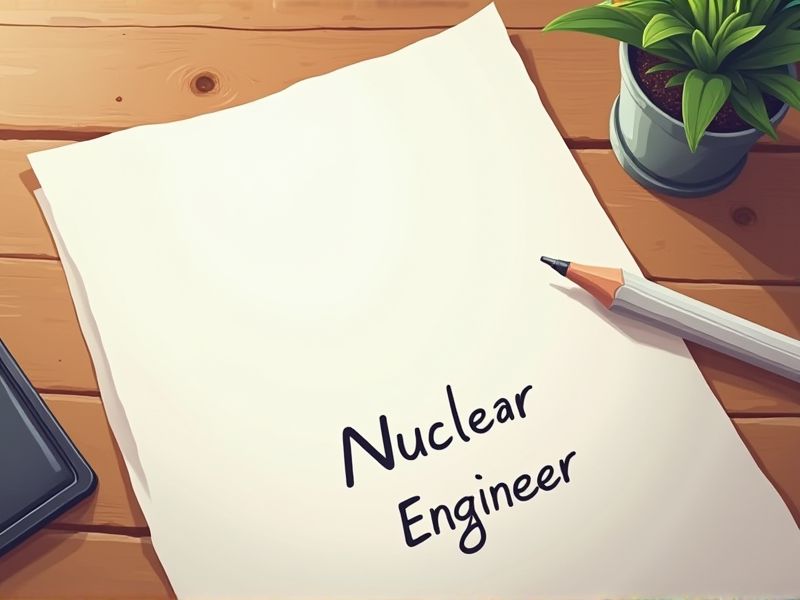
Nuclear engineering involves complex systems and high-risk environments, necessitating stringent safety protocols. Certification ensures that engineers have the necessary knowledge and skills to adhere to these protocols effectively. Organizations and governing bodies mandate certifications to comply with industry standards, thus minimizing the risk of accidents and operational failures. These crucial certifications help nuclear engineers maintain competence and stay updated with technological advancements.
Professional Engineer (PE) License - Nuclear Engineering Endorsement
Obtaining a Professional Engineer (PE) License with a Nuclear Engineering Endorsement ensures that the engineer has met rigorous standards of education, work experience, and ethics, which is crucial in a field that demands high safety and precision. The license enhances credibility and trust among employers, regulatory bodies, and the public, as they can be confident in the engineer's qualifications and ability to adhere to industry standards. It may be required by law or policy for certain positions or projects, especially those involving safety-critical systems and operations. The PE license-holder can sign off on engineering plans and documents, granting them a higher level of responsibility and professional autonomy.
Fundamentals of Engineering (FE) Certification - Nuclear Engineering Track
The FE Certification for the Nuclear Engineering Track establishes a standardized foundation of knowledge, which is crucial for ensuring technical proficiency in nuclear engineering. Employers often require this certification as it signifies the holder's commitment to maintaining industry standards in safety and engineering practices. Passing the FE exam serves as the first step towards obtaining a Professional Engineer (PE) license, enhancing credibility and career advancement prospects. In a field where precision and safety are paramount, the certification reassures stakeholders of the engineer's ability to manage complex nuclear systems effectively.
Nuclear Regulatory Commission (NRC) Certification/Training
NRC certification ensures nuclear engineers understand and comply with stringent safety standards essential for preventing accidents. Training equips engineers with the knowledge to handle radioactive materials, minimizing environmental and public health risks. Certification requires staying current with evolving nuclear technology and regulatory updates, fostering a culture of continual learning. The NRC credential enhances credibility, making engineers more effective in roles demanding high responsibility and precision.
Certified Health Physicist (CHP)
A Certified Health Physicist (CHP) is essential for nuclear engineers to ensure compliance with radiation safety standards, which minimizes risks to workers and the public. By providing expertise in radiation monitoring and protection strategies, a CHP helps maintain safe operating environments in nuclear facilities. Their specialized knowledge in health physics is crucial for interpreting complex data and guiding engineers on safe procedures. Collaborating with nuclear engineers, CHPs also play a vital role in developing emergency response plans that protect communities in the event of a nuclear incident.
Certified Reactor Operator (CRO)
Certified Reactor Operators (CROs) are crucial for nuclear engineers because they ensure the safe and efficient operation of nuclear reactors. With specialized training, CROs manage reactor systems, minimizing risks of accidents and optimizing power output. Their expertise in handling reactor anomalies supports engineers in maintaining operational stability and regulatory compliance. With CROs, nuclear plants achieve higher safety standards and operational efficiency.
Project Management Professional (PMP)
Obtaining a Project Management Professional (PMP) certification is important for nuclear engineers because it provides them with essential skills to effectively manage complex projects, which are prevalent in the nuclear industry. The rigorous standards of the PMP certification ensure that engineers can plan, execute, and oversee projects with a focus on safety and regulatory compliance. A strong understanding of project management principles enhances coordination among multidisciplinary teams, crucial in nuclear projects that involve high-stake engineering tasks. The certification also offers a competitive edge in the industry, often resulting in better job prospects and career advancement opportunities for nuclear engineers.
Lean Six Sigma Green Belt Certification
Lean Six Sigma Green Belt certification equips nuclear engineers with process optimization skills, improving efficiency in complex nuclear operations. By utilizing data-driven methodologies, these engineers can enhance safety protocols within nuclear facilities. The certification fosters a problem-solving mindset, essential for maintaining rigorous quality standards in nuclear engineering projects. It also enables engineers to reduce operational costs by identifying and eliminating waste in nuclear processes.
Lean Six Sigma Black Belt Certification
The Lean Six Sigma Black Belt Certification equips nuclear engineers with advanced tools for process optimization, leading to enhanced operational efficiency. This certification underlines a commitment to maintaining high safety standards, critical in the nuclear industry to minimize risks. By fostering a data-driven approach, Black Belt credentials enable engineers to make informed decisions, improving project outcomes. The certification also expands career opportunities by demonstrating expertise in industry-standard methodologies.
Certified Energy Manager (CEM)
The increased focus on energy efficiency in nuclear facilities requires expertise in identifying areas for reducing energy consumption, which a Certified Energy Manager (CEM) provides. Compliance with environmental regulations demands the development of sustainable strategies, a task suited to a CEM's qualification. Achieving cost efficiency in nuclear power production hinges on effective energy management, making a CEM crucial for operational optimization. Risk mitigation in complex energy systems relies on a CEM's ability to assess and enhance energy performance, integrating seamlessly with nuclear engineering objectives.
International Atomic Energy Agency (IAEA) Training Certification
The IAEA Training Certification ensures that nuclear engineers meet international safety and security standards, which helps prevent nuclear incidents. This certification provides engineers with the knowledge needed to manage nuclear materials responsibly and efficiently. It enhances global cooperation by standardizing nuclear education and practices across different countries. Employers and regulatory bodies often require this certification to verify the competency and reliability of nuclear professionals.
Summary
When you obtain certifications as a nuclear engineer, your career prospects significantly expand. Certified professionals often see increased earning potential, as certifications validate specialized skills. Employers tend to prioritize candidates with recognized qualifications, leading to more job offers and advancement opportunities. Enhanced credibility also creates a platform for engaging in more complex projects and leadership roles within the industry.
